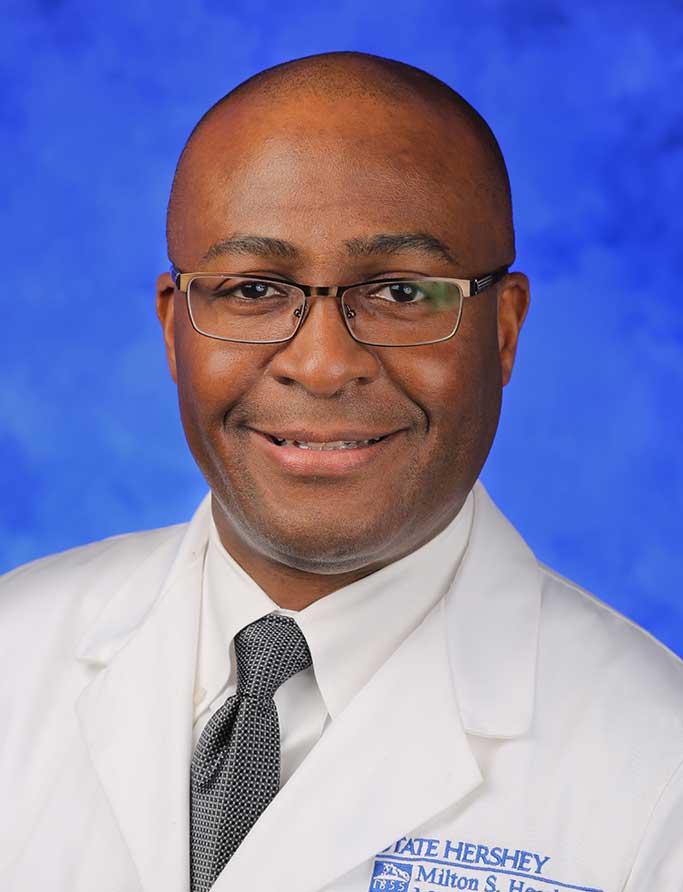Department of Medicine shares diversity news for May 2021
About the Department of Medicine Diversity, Equity and Inclusion Council
The mission of the Department of Medicine’s Diversity, Equity and Inclusion Council is to be a resource and advocate for all issues related to diversity, equity and inclusion within the Department of Medicine.
The council strives to foster an organizational change that creates, promotes and nurtures the value of a multicultural environment and varied perspective to serve Penn State Health’s missions.
It also strives to build collaborations and bridges with communities in the region as the Penn State Health family expands in central Pennsylvania.
As part of that mission, the council has created a monthly newsletter. This is the May 2021 edition.
Welcome
It is with great pride that we share with you our first Diversity, Equity and Inclusion Newsletter. This newsletter will be a forum to share learning and perspective on diversity topics for faculty (including fellows and residents), students and staff members, as well as an index of upcoming events by the Diversity, Equity and Inclusion Council, such as the newly created Diversity Grand Rounds series.

Dr. Stephen Henderson
The newsletter also highlights specific holidays, cultural observations and events in our surrounding communities for you to become engaged in and volunteer.
Our voice is strong when we work together as one, to celebrate our diversity and share the humanity we have in common.
Thank you and please enjoy.
Stephen Henderson, MD
Chair, Department of Medicine Diversity, Equity and Inclusion Council
Department of Medicine Diversity, Equity and Inclusion Council members:
Ayesha Ahmad, MD; Glenn Buchberger, MD; Alia Chisty, MD, MS; Nasr Ghahramani, MD, MS; Fahad Khalid, MD; Karen Krok, MD; and Ifesinachi Ndukwu, MD, MBA
Jump to topic
Search
Ongoing Initiatives
We kicked off our Diversity Grand Rounds series in September 2020 with a roundtable discussion celebrating women in medicine, followed by a panel focused on the experiences of Hispanics/Latinx people in medicine.
The most recent panel, “Black Physicians in Medicine and COVID-19 Health Disparities in the Black Community ― Changing the Narrative,” was held in March and featured Drs. Stephen Henderson, Ifesinachi Ndukwu, Kofi Clarke and Leah Ross, as well as Dr. Karima Fitzgerald from the Department of Surgery. The panel was moderated by Lynette Chappell-Williams, JD, associate dean for diversity and inclusion and chief diversity officer for the College of Medicine. (Chappell-Williams is also Penn State Health’s chief diversity officer.)
The next Diversity Grand Rounds, the last of the academic year, will be held June 15. This panel will highlight the experiences of Asian-American physicians within the Department of Medicine – stay tuned for details.
See previous Medicine Grand Rounds presentations on Mediasite
(Penn State Health ePass login required)
Presentations available on Mediasite include:
- March 2, 2021: Black Physicians in Medicine and COVID-19 Health Disparities in the Black Community ― Changing the Narrative
- Nov. 24, 2020: Hispanics/Latinx in Medicine: Promoting Diversity in the Workplace and Health Challenges within the Hispanic/Latinx Community
- Sept. 1, 2020: Women in Medicine: Promoting Gender Diversity in the Workplace
Penn State Health’s online introductory Microaggressions, Unconscious Bias and Upstander Education (MUBUE) started Jan. 26, 2021, with a goal of completion by 85% of the health system workforce. As of this date, 82% have completed the education. There will be a second, more extensive MUBUE program starting in October 2021 that will provide Penn State Health employees the opportunity to further their education on these topics through art, mask-making, skits, jazz or storytelling.

Lynette Chappell-Williams, JD
To access the MUBUE training, go to Compass or Lion, search for “2021 Diversity and Inclusion Education and Acknowledgement” and complete the five modules:
- Diversity and Inclusion Pre-Poll
- PSH ADM120 Acknowledgement
- HR86 Acknowledgement
- Microaggressions, Unconscious Bias and Upstander version 2
- Diversity and Inclusion Post-Poll
The entire curriculum will take approximately 35 minutes to complete. The goal of this training is to provide basic information on these concepts to the workforce. There will be an evaluation completed to assess to what extent people learned about these concepts.
Those who finish the online diversity and inclusion education have the opportunity to participate in an Upstander Café, an informal monthly gathering of employees who convene to practice their upstanding skills. The initial gatherings are being held virtually through Zoom from June until August, but will be in person beginning in September 2021.
To join this experience, email diversity@pennstatehealth.psu.edu and include “Upstander Café” in the subject line.
Special thanks to Lynette Chappell-Williams, Vice President and Chief Diversity Officer for Penn State Health, for providing the MUBUE info in a recent system-wide email!
The development of MUBUE pocket cards is also in production. The goal is to mass-distribute these pocket cards across the department for everyone to have as a reference to utilize MUBUE training in real time in the workplace.
The existing Diversity Book Club is hosted by the Department of Humanities at the College of Medicine. Every other month in the year, the club has met to discuss a curated list of fiction capturing the experiences of African-Americans and Black authors.
The final discussion, focused on “The Color Purple” by Alice Walker, was held May 19. As future Diversity Book Club discussions are scheduled, participants are welcome to have lunch while the group chats. Stay tuned for details on upcoming Diversity Book Club gatherings!
The Diversity Council’s recommended books for a potential future Department of Medicine Diversity Book Club include “White Fragility” by Robin DiAngelo and “What the Eyes Don’t See: A Story of Crisis, Resistance, and Hope in an American City” by Mona Hanna Attisha.
Physicians in the Department of Medicine and the Diversity, Equity and Inclusion Council have partnered with Ashley Visco (Community Health director), Jeanette Gibbs (Senior Vice President for Ambulatory Services, Penn State Health Medical Group), Lynette Chappell-Williams and others throughout Penn State Health and the College of Medicine to host pop-up COVID-19 vaccination clinics in underserved communities and communities of color.
Clinics have been held in cities such as Harrisburg, Lancaster, Lebanon and Reading, and more will be planned in the coming months.
This important outreach effort would not have been possible without the partnership of local leaders – their advocacy for and connection to their communities has been instrumental. We are proud to be part of this initiative.
Volunteer at an upcoming clinic here
Dr. Ayesha Ahmad shared the following photo from the vaccination drive she participated in at Hadee Mosque in Harrisburg that was held through the Pennsylvania Immigrant and Refugee Women’s Network.
This important outreach project has gotten some local news traction as well – you might see some familiar faces in this brief clip by WGAL.
Event of the Month
This event is hosted by the College of Medicine’s Office for Diversity, Equity and Inclusion.
Inclusion Academy: Intersectionality of the Opioid Challenge and Diversity
7 to 8 a.m. June 17
The Inclusion Academy, established by the Office for Diversity, Equity and Inclusion, is an educational program focused on providing students, faculty/staff and health care providers at Penn State Health and Penn State College of Medicine with cultural knowledge and understanding of various diverse/marginalized communities with the intention to foster diversity and inclusion in all facets of the organization.
The opioid epidemic was declared a public health emergency in March 2017 and the impact of opioid misuse continues to remain a cause for alarm in the United States. The effect this epidemic has had on racial/ethnic minority populations has been largely overlooked. There is a rather large treatment gap between white patients and non-white minority populations, with black patients being significantly less likely to be prescribed pain management medication even after adjustment for severity of pain.
In this session, participants will learn more about the concept of intersectionality and how it applies to the opioid epidemic. The session has both in-person and virtual options; participants should select their preferred attendance method when registering.
Cultural Corner: Recent Holidays, Observances and Celebrations
Information submitted by Dr. Nasr Ghahramani
Nowruz is a holiday that has been celebrated by people from diverse ethnic communities and religious backgrounds for more than 3,000 years.
It is estimated that more than 200 million people celebrate Nowruz in Iran, Afghanistan, Tajikistan, Turkmenistan, Uzbekistan, Kyrgyzstan, Kazakhstan, Northern Iraq, India, Eastern Turkey, Albania, Macedonia, Azerbaijan and the North Caucasus.
Nowruz marks the first day of spring and the beginning of the year in the Persian calendar.

This photo from Wikimedia Commons shows a traditional Nowruz table arrangement.
In the Jewish religion, Passover commemorates the story of the Israelites’ departure from ancient Egypt.
The weeklong festival is observed through rituals such as the traditional meal known as seder, which celebrates Moses freeing the Israelites.
Ramadan is a holy month of fasting, introspection and prayer for Muslims, the followers of Islam.
It is celebrated as the month during which Allah, or God, revealed the first verses of the Quran to the prophet Mohammed.
Most of the world’s 1.6 billion Muslims observe Ramadan.
Personal Reflection, Narratives, Short Stories and Poetry
This newsletter welcomes creative writing submissions from physicians, faculty, staff and students! Send ideas and completed works to Jessica Bogard at jbogard@pennstatehealth.psu.edu.

Dr. Stephen Henderson
She presented with another Sickle Cell Crisis, day before her 22nd birthday.
My first patient as an intern.
Bilateral leg ulcers visible to the eye. Tulips delivered from her twin brother the night before.
Intravenous fluids, Dilaudid, and Oxygen.
Morning rounds, code called. Compressions performed, unsuccessful.
Beautiful peacefulness in her eyes, flowers at her bedside.
A reflective piece by Dr. James Hobley, titled “For many black physicians, they may be ‘just one decision away,'” has been printed in the Healio Gastroenterology journal.
Dr. Hobley was a GI fellow with us from 2003 to 2006 and has clearly gone on to do great things in medicine, including sharing his perspectives on the intersection between race and medicine.
Other Department of Medicine Diversity Initiatives and Projects
Information submitted by Dr. Ann Ouyang

Dr. Ann Ouyang
We, the “Changemakers,” want to hear your stories that involve bias around race and ethnicity. We will use them to create short film vignettes to educate our coworkers within our organization to promote a diverse and inclusive environment for all those who work here, and who choose Penn State College of Medicine and Penn State Health for their education and care.
Submit stories anonymously here or contact any of the team members listed below.
This project is supported by a grant from the Doctors Kienle Center for Humanistic Medicine. Team members include Drs. Ann Ouyang, Kaleigh Krill and Meeta Desai, as well as Misty Lewis, Sharia Benn (Sankofa African American Theatre Company) and Rick Lombardo (Penn State College of Arts and Architecture).
In a recent system-wide email, Lynette Chappell-Williams shared the following information:
Penn State Health now has a new compliance hotline for reporting bias and microaggressions.
You can report online at pennstatehealth.org/hotline or by calling 800-560-1637.
What we say can have a negative and harmful impact, even if we don’t intend to send the wrong message or don’t even realize that we’re speaking insensitively. In this section, we highlight two words that should be avoided, if possible, due to troubling histories or origins.
Peanut gallery
This phrase dates back to the late 1800s Vaudeville era and originally described the “peanut gallery” section in theaters, which usually had the cheapest and lowest-quality seats, and thus this section was usually where those with limited means sat during shows.
In the segregated South, seats in the back or upper balcony levels were mostly reserved for Black people, and in this context the term took on an even more racist connotation.
Learn more in this article on The Conversation
Uppity
This term is used these days to describe a stuck-up or arrogant person, but it was commonly used during Segregation by racist southerners to describe Black people who didn’t know their socioeconomic place.
Learn more about the history of this phrase in this Today article
The following event is hosted by the College of Medicine’s Office for Professional Mental Health. We will highlight Department of Medicine-specific events in the future.
Allyship Support Group Meeting
6 to 7 p.m. July 14
This support group meets once a month to discuss topics and articles related to being an ally or other topics involving getting discussions started about race relations.
Contact the Newsletter Team
Lead editor: Jessica Bogard (jbogard@pennstatehealth.psu.edu)
Co-editors: Dr. Karen Krok (kkrok@pennstatehealth.psu.edu) and Dr. Nasr Ghahramani (nghahramani@pennstatehealth.psu.edu)

Dr. Karen Krok and Dr. Nasr Ghahramani
With questions or suggestions for this newsletter, email Jessica Bogard at jbogard@pennstatehealth.psu.edu.
If you're having trouble accessing this content, or would like it in another format, please email the Penn State College of Medicine web department.
